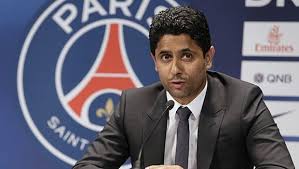By Andrew Warshaw
April 22 – When Paris St Germain were conspicuous by their absence as a member of the so-called “dirty Dozen” clubs who formed the elitist but ill-fated European Super League, UEFA president Aleksander Ceferin made a point of personally praising PSG boss Nasser Al-Khelaifi for refusing to join the much derided cartel.
Neither PSG nor Al-Khelaifi have been everyone’s cup of tea. Or UEFA’s for that matter. Not so long ago, both parties were locked in an ugly legal spat over whether PSG, with its unlimited funds and array of world superstars, had breached financial fair play rules.
Yet when it came to the European Super League, Al-Khelaifi stood his moral ground and has now got his reward: replacing Juventus boss Andrea Agnelli, one of the architects of the doomed breakaway league, as head of the European Clubs Association.
Whether Al-Khaleifi, like Ceferin, felt betrayed by Agnelli seemingly speaking with forked tongue in terms of where his real objectives lay over the future of European football, he hasn’t said, publicly at least.
But the fact that he and Agnelli worked side by side, not only within the ECA but also as the two club representatives on the UEFA executive committee, suggests he would not have taken kindly to being blindsided by the Italian if that’s what actually happened.
Hence, in his acceptance speech, Al-Khaleifi made it clear how badly trust needed to be restored within the 246-strong ECA which is now shorn of all 12 founder members of ESL, making PSG the most influential and affluent club left among its ranks.
“The leadership, integrity and togetherness of our organisation has never been more required than at this pivotal moment in European football,” he said before adding, pithily: “I, alongside all my fellow ECA board members and clubs, am looking to reinforce ECA in its role as the legitimate and singular voice of Europe’s clubs.”
Earlier, the ECA said it welcomed the decision made by the majority of the clubs in not pursuing the breakaway project.
“ECA firmly believes this project could not succeed because football, at its core, is based on openness, sporting excellence and an inherent connection between everyone across the football family,” it said.
“Football is for everybody. Recent events have been a reminder that club owners are merely custodians of their clubs, which are historic beacons that mean so much to fans and their communities.”
The fact that PSG and Bayern Munich, the two biggest clubs not to sign up to the Super League, now hold the two ECA seats on the UEFA exco cannot be under-estimated. Not only will Al-Khaleifi and Bayern boss Karl-Heinz Rummenigge have to restore a fractured relationship with European football’s governing body on behalf of ECA members but also look at whether UEFA’s new-look Champions League format will have to be tweaked to keep everyone happy – including, one suspects, the dirty dozen.
There are, perhaps, other factors why Al-Khaleifi may have stopped short of joining the renegades. Firstly he heads Doha-based broadcaster beIN Sports Group, one of UEFA’s biggest commercial partners. Secondly, of course, his native Qatar stages the 2022 World Cup.
But having stayed clear of the mutinous pack, Al-Khaleifi and his club have suddenly gone up in everyone’s estimation, not least Ceferin’s.
“Football needs good people in senior roles and Nasser is someone who has shown he is capable of looking after the interests of more clubs than just his own – which should be a pre requisite for the position of ECA chair,” Ceferin said
“I look forward to working with him to shape the future of club football at a European level. He is a man I can trust.”
Something that has been in short supply over the past few days.
Contact the writer of this story at moc.l1745644087labto1745644087ofdlr1745644087owedi1745644087sni@w1745644087ahsra1745644087w.wer1745644087dna1745644087

